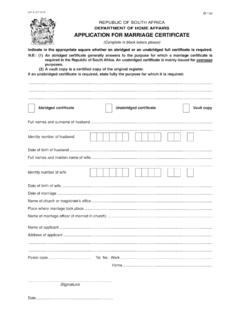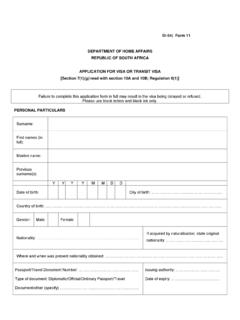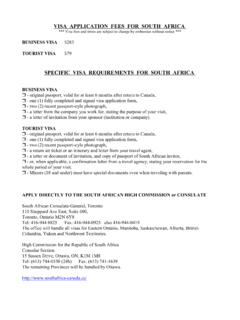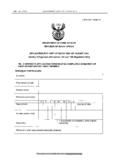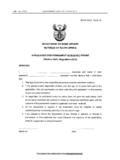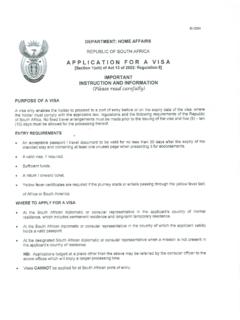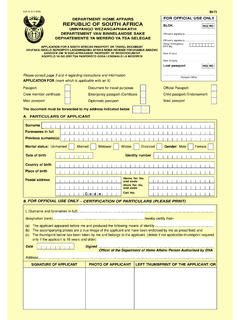Transcription of Case CCT 35/99 RAHIM DAWOOD First Applicant - SAFLII …
1 CONSTITUTIONAL COURT OF south africa Case CCT 35/99 RAHIM DAWOOD First Applicant KHAHATTHA DAWOOD (born CHAISORN) Second Applicant versus THE MINISTER OF home affairs First Respondent THE DIRECTOR-GENERAL: home affairs Second Respondent THE MINISTER OF FINANCE Third Respondent and NAZILA SHALABI (born ADAMS) First Applicant AHMED TALAAT MAHMOUD HAFED SHALABI Second Applicant versus THE MINISTER OF home affairs First Respondent THE DIRECTOR-GENERAL: home affairs Second Respondent THE REGIONAL REPRESENTATIVE OF THE DEPARTMENT OF home affairs (CAPE TOWN) Third Respondent and MAUREEN SHEILA THOMAS (born FREDERICKS) First Applicant COLIN PATRICK THOMAS Second Applicant versus THE MINISTER OF home affairs First Respondent THE DIRECTOR-GENERAL: home affairs Second Respondent THE REGIONAL REPRESENTATIVE OF THE DEPARTMENT OF home affairs (CAPE TOWN) Third Respondent Heard on : 23 March 2000 Decided on : 7 June 2000 JUDGMENT O=REGAN J: Introduction [1] All three cases before us concern the circumstances in which foreign spouses of south African residents are permitted to reside temporarily in south africa pending the outcome of their applications for immigration permits.
2 In each case the applicants are married to each other. One spouse is permanently and lawfully resident in south africa while the other is seeking to obtain an immigration permit to reside permanently in south africa . Because the matters raised similar issues they were heard together by the Cape of Good Hope High Court1 and by this Court. 1 The judgment of that court is reported as DAWOOD and Another v Minister of home affairs and Others; Shalabi and Another v Minister of home affairs and Others; Thomas and Another v Minister of home affairs and Others 2000 (1) SA 997 (C). 2 [2] In terms of the Aliens Control Act, 96 of 1991 (the Act), a person who is not a south African citizen may not enter or reside in south africa without a valid permit.
3 Permits may be issued on a temporary basis for a variety of purposes, including holiday visits, business, employment, or study,2 or on a permanent Permanent permits or Aimmigration permits@ 2 Section 26(1) of the Act provides as follows: AThere shall for the purposes of this Act be the following categories of temporary residence permits: (a) A visitor=s permit, which may be issued to any alien who applies for permission to temporarily sojourn in the Republic for any bona fide purpose other than a purpose for which a permit referred to in paragraphs (b) to (f) is required; (b) a work permit, which may be issued to any alien who applies for permissionC (i) to be temporarily employed in the Republic with or without any reward; or (ii) to temporarily manage or conduct any business in the Republic whether for his or her own account or not; (c) a business permit, which may be issued to any alien who applies for permission to enter the Republic to attend to business matters, other than business matters for which a work permit is required; (d) a study permit, which may be issued to any alien who applies for permission to enter and temporarily sojourn in the Republic as a bona fide student at any primary, secondary or tertiary educational institution.
4 (e) a workseeker=s permit, which may be issued to any alien who applies for 3 O=REGAN J authorise a person to reside permanently in south africa . The non- south African spouse in each of the cases before us is seeking to obtain an immigration permit. permission to enter the Republic in order to enter into a contract of employment with an employer in the Republic referred to in paragraph (b)(i) or to enter into a contract for the purposes of paragraph (b)(ii); and (f) a medical permit, which may be issued to any alien who applies for permission to enter the Republic for the purposes of receiving medical treatment.
5 @ 3 Applications for and grants of immigration permits are made in terms of section 25 of the Act. 4 O=REGAN J [3] There were two principal issues raised by the three applications in the High Court. The First related to a non-refundable fee payable by applicants for immigration permits when they lodge their applications. This fee was introduced, in effect, in 1998 and set at R7 A year later it was increased to R10 The applicants sought an order declaring that in so far as spouses were concerned, the regulations providing for these fees were inconsistent with the Constitution and invalid. The second issue concerned section 25(9)(b)6 of the Act, and in particular, the question whether it was constitutional for the Act to require that an immigration permit could be granted to the spouse of a south African citizen who is in south africa at the time only if that spouse is in possession of a valid temporary residence permit.
6 [4] The Cape High Court upheld the applicants = arguments in respect of both issues and made an order declaring the relevant fee regulations and section 25(9)(b) of the Act to be invalid. Both these declarations of invalidity were suspended, the First for three months and the second for twelve months. The Court also granted consequential relief. The facts of the three applications appear in full from the judgment of Van Heerden AJ. I shall therefore only set out the key facts 4 Item 13 of the annexure to regulation 2 of the Schedule to the Fifth Amendment of the Aliens Control Regulations (Fees), 1998 Government Gazette 18791, GN R461 of 30 March 1998. 5 Item 16 of the annexure to regulation 2 of the Schedule to the Sixth Amendment of the Aliens Control Regulations (Fees), 1999 Government Gazette 19881, GN R386 of 25 March 1999.
7 6 The provisions of this subsection are set out at para 19 below. 5 O=REGAN J in this judgment. The DAWOOD application [5] Mr and Mrs DAWOOD , the First and second applicants , were married according to Islamic law on 4 October 1997 and they have one child, a daughter, who was born on 11 March 1999. Mr DAWOOD , a south African citizen, is a watchmaker who earns approximately R3 000 per month. Mrs DAWOOD , a Thai national, is presently unemployed. She entered south africa early in 1997 for a holiday and was granted a temporary residence permit valid until 30 April 1997. This permit was subsequently extended three times. In December 1997, shortly after their marriage, Mr and Mrs DAWOOD obtained application forms for an immigration permit for Mrs DAWOOD to obtain permission to reside permanently in south africa .
8 These forms required the submission of a police clearance certificate from Thailand. It apparently took some time for Mrs DAWOOD to obtain this certificate. When she returned to the Department of home affairs (the Department) in June 1998, she was informed that if a complete application for an immigration permit was not submitted before 30 June 1998, she would be required to pay the non-refundable fee of R7 750 that had recently been introduced by As she was not at that stage able to submit a completed application, the Dawoods sought an exemption from payment of this fee. An exemption was refused and the Dawoods then approached the High Court for relief. They sought, in particular, an order declaring the regulations that imposed the fees (both the earlier regulation setting the fee at R7 750 and the subsequent regulation increasing it) to be inconsistent with sections 9, 10, 21(3) and 28 of the Constitution and therefore invalid.
9 7 See above n 4. 6 O=REGAN J The Shalabi application [6] Mr and Mrs Shalabi married according to south African civil law on 7 May 1996 in Cape Town and they have one child, a son, born on 11 January 1999. The First Applicant , Mrs Shalabi, is a south African citizen employed as a staff nurse earning approximately R2 800 per month. Mr Shalabi is an Egyptian citizen. He First entered south africa on 16 November 1995 and was granted a temporary residence permit. On several occasions thereafter Mr Shalabi was granted further temporary residence permits. The details of the grant of these permits need not be set out, save to say that on several occasions Mr Shalabi was granted an extension of his temporary residence permit even though his application for that extension was made only after the permit had expired.
10 On 2 September 1997, while in possession of a valid temporary residence permit due to expire only on 31 December 1997, Mr Shalabi applied for an immigration permit. At the time, he was given a notice by the Department stating that even though he had made an application for an immigration permit, he was required to ensure that his temporary residence permit did not In April 1998, after his permit had expired, Mr Shalabi was informed by the Department that his application for an immigration permit could not be processed unless he applied for an extension of his temporary residence permit. On 9 July 1998, Mr Shalabi made such an application which was refused on the grounds that he was illegally in south africa and he was ordered to leave south africa by 11 August 1998.










